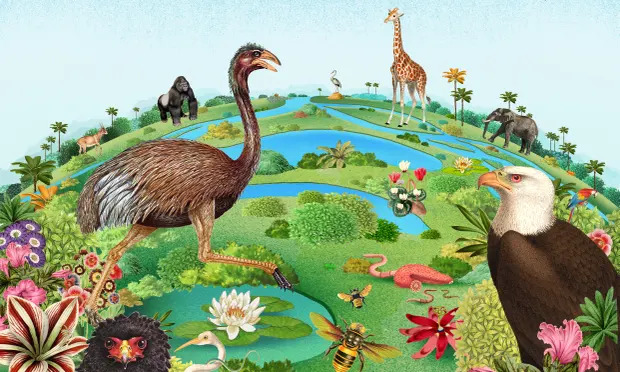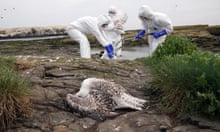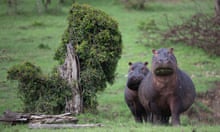 Rewilding came to the fore in 2022, with projects happening across the globe. Illustration: Valero Doval/The Guardian
Rewilding came to the fore in 2022, with projects happening across the globe. Illustration: Valero Doval/The Guardian
–
–
The Age of Extinction is supported by
But the fact that nearly 200 countries were able to sign off on an international agreement to halt the loss of biodiversity is something to applaud. Few thought it would happen. Now it is all about the implementation. With an estimated 1 million species at risk of extinction and a 69% average plunge in wildlife populations between 1970 and 2018, we must not “pause for a second”, warned the UN’s environment chief, Inger Andersen.
“We need to change the relationship between people and nature. And if we are honest, time is not on our side,” Andersen said in Montreal. “We’ve backed nature into a corner and it’s time to ease the pressure. We also know it is a remarkable thing and nature is very forgiving. If we give it half a chance, it will bounce back.
“Let’s not pause for a second. Embrace the history we have made in Montreal and let’s get down to the business of delivering the framework.”
Away from Cop15, rewilding came to the fore in 2022, with projects across the globe, from the reintroduction of bison and cluster rewilding in the UK to big ambitions in Argentina, lessons learned in the Netherlands and the US, and the 10th Rewilding Europe project launched. Leonardo DiCaprio and Ellie Goulding were two celebrities who expressed their support for the movement during the Age of Extinction’s Wild World project.
As we enter 2023, many are gaining inspiration from the past, with an uptick in regenerative farming, the return of ancient crops such as buckwheat and Welsh oats, and the harnessing of ancient irrigation systems. Others are looking forward, taking innovate steps in conservation, including collecting fog, turning bus stops into homes for pollinators and utilising artificial intelligence.
Target 6 of the new Kunming-Montreal agreement at Cop15 is to “eliminate, minimize, reduce and/or mitigate the impacts of invasive alien species on biodiversity and ecosystem services”. In Germany, marbled crayfish have invaded lakes and rivers, while snakes threaten the wall lizard on Ibiza and disease is blighting oranges in mainland Spain. But the success of eradication measures on islands from the Pacific to the Scillies shows what can be done.
We have shone a light on the work of conservation in protecting species, including the US larch, ospreys in the UK and caribou in Canada, and reported on the euphoria, unexpected moments, and special privilege of rediscovering species feared extinct in our Lost and Found series. There were also many stories of individual efforts to protect wildlife, including that of the former Weetabix salesman who has made homes for 60,000 swifts in the UK and the “winterkeeper” of Yellowstone park who has observed nearly 50 years of climate change impact on his watch. Keen gardeners brought a flavor of the Caribbean to London and a spot of color to the city’s underground stations.
The news wasn’t all good, perhaps the most devastating was the global loss of a huge number of wild birds, with northern gannets, pelicans, skua and members of myriad other species dying from avian flu. “It’s just the scale of it which is hard to grasp,” Gwen Potter, a UK National Trust countryside manager working on the Farne Islands, off the coast of Northumberland, told the Guardian.
Humanity’s track record on its treatment of the natural world is not good. But perhaps the agreement achieved at Cop15 can give us hope that we are ready to start to turn the tide and that 2023 will see concerted efforts to halt the loss of biodiversity.
–
Sign up to Down to Earth – Free weekly newsletter
The planet’s most important stories. Get all the week’s environment news – the good, the bad and the essential
Privacy Notice: Newsletters may contain info about charities, online ads, and content funded by outside parties. For more information see our Privacy Policy. We use Google reCaptcha to protect our website and the Google Privacy Policy and Terms of Service apply.
–
Topics
–
Most viewed
(For the source of this, and many other equally intriguing and important articles, please visit: https://www.theguardian.com/environment/2022/dec/26/2022-the-year-rewilding-went-mainstream-and-a-biodiversity-deal-gave-the-world-hope/)
















